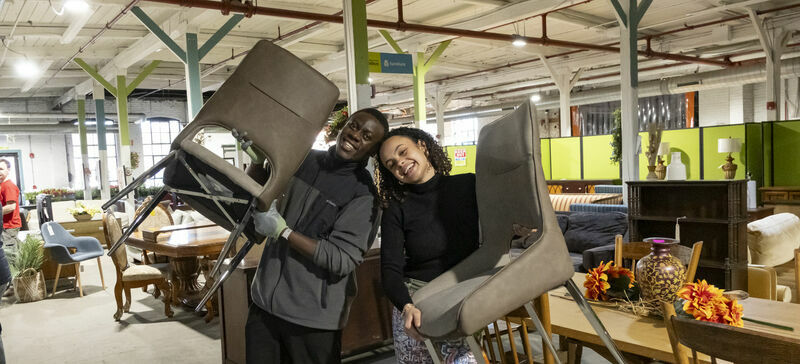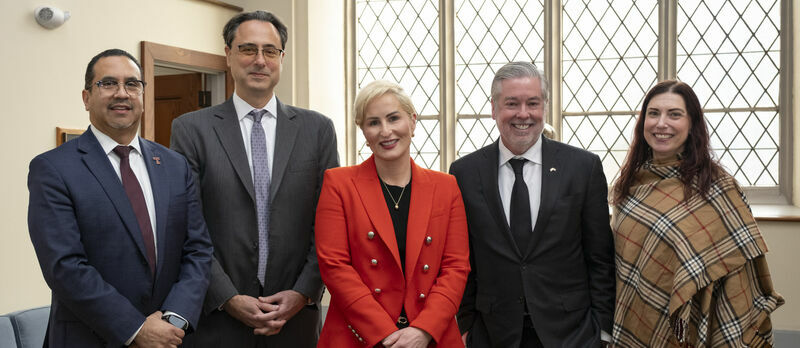Fueling fascination: History alum examines how our senses inform gasoline retail
In his doctoral thesis, Gary Scales, CLA ’24, explores the history of U.S. gas stations from 1910 to 1999 and posits that retailers produced a system of sensory exchange that influences the economic marketplace.

When we drive up to the gas pump at Wawa, our senses are immediately flooded: The large sign in red lettering signals us to pull in. Music and ads play on repeat. The smell of coffee and signature sandwiches invites us inside the store.
According to Gary Scales, CLA ’24, we’re engaging in a sensory exchange that in turn impacts the economic marketplace where we make decisions on how we spend money.
“Selling gas is never about gas. Because you can’t sense it, it’s a blind purchase,” said Scales. “You hand your money over and hope whatever you put in the pipe works in your car.”
In his doctoral thesis titled Gasoline Retail and the Making of Neurocapitalism, Scales examines the sensory history of U.S. gas stations from 1910 to 1999. He asserts that because gasoline itself is imperceptible upon purchase a system of sensory retailing occurs that both helps and hurts gas retailers’ profits and their way of life.
So how do retailers create a sense of meaning and belief in the transaction? Scales’ research asks.
“What they have to sell instead is something that is more than gas alone, so they sell things that influence our senses. It was once tires and quiet engines; now it’s mainly drinks and food,” he explains.
The power of non-human elements is vital, adds Scales. In the case of Harry’s Service Station in Saline, Michigan, it was the comfort of a canine companion.
Scales recounts the story of Charlie, a dog who became famous for collecting customers’ money and bringing them items. He notes that Charlie didn’t just provide gas and good service but also “attention, efficiency, relief and stability.”
“People went to that gas station because of Charlie. They were searching for something more than what the typical transaction gave them,” said Scales.
Additionally, his research revealed a pattern in which the same things that once made profit or gave security to retailers would undo them later and cause financial losses.
One example Scales provides is the invention of self-serve, which he argues was ineffective for retailers. Originally, they believed it would enable profit by eliminating the need for a gas attendant but learned self-serve would have to be paired with something unrelated to gas to succeed.
“The self-serve pump stripped everything down until there was no room for any sensations, which only did a disservice to retailers and customers,” said Scales. Hence convenience stores started popping up at gas stations in the 1980s to service the person as well as the car.
When examining U.S. gas stations throughout the 1900s, he also found ambiguity between how retailers marketed to the car and the person. He says this uncertainty still exists today and believes that the two aren’t so different.
“Things and people work together. We divide ourselves from things, but things have social lives. Objects have the same power to act upon us as we do to act upon them, but it can be uncomfortable to assume objects and people have this same level of agency and power,” he said. "We like to control the exchange—what we might generally call marketing—but the history of the gas station suggests we have far less control over it than we like to pretend."
"Seeing ourselves and objects as aggregate actors changes the way we understand capitalism," added Scales. "When thinking about capitalism, we think about commodities and profits, but there’s something more fundamental. Capitalism is driven neurologically as much as it is economically.”
Scales, who’s originally from Northwest London, felt inspired after taking Associate Professor of History Seth Bruggeman’s History of American Material Culture class, which informed the methods for his thesis. He was also fascinated by Laura H. Carnell Professor of History Bryant Simon’s book Everything but the Coffee: Learning about America from Starbucks and came to Temple to work with him.
“What I learned at Temple has changed or enhanced the way I’ve used objects and things, and it has taught me to forget concepts I once used,” said Scales. “For example, I don’t divide history into periods because viewing it as linear or cyclical can limit our understanding of time and our experience.”
Scales hopes his thesis on gas retailing broadens our perspective. “This research opens an avenue for us to think about how immediate our world is and how that influences the stories we tell.”


